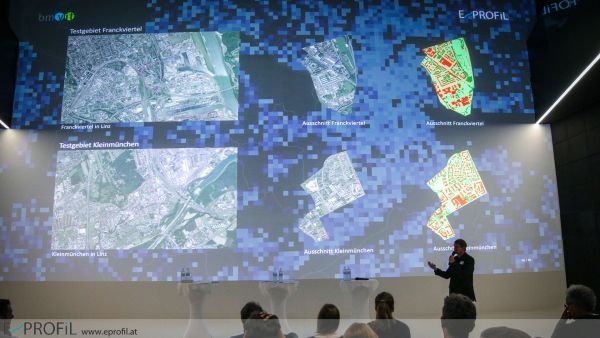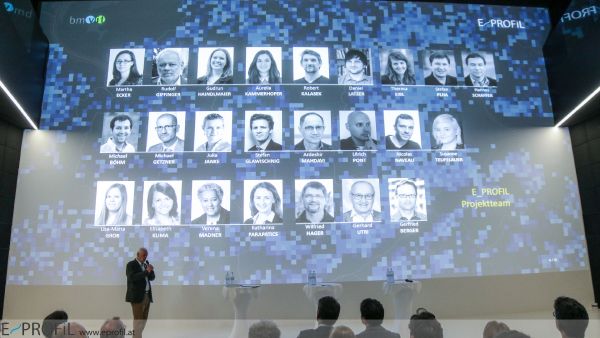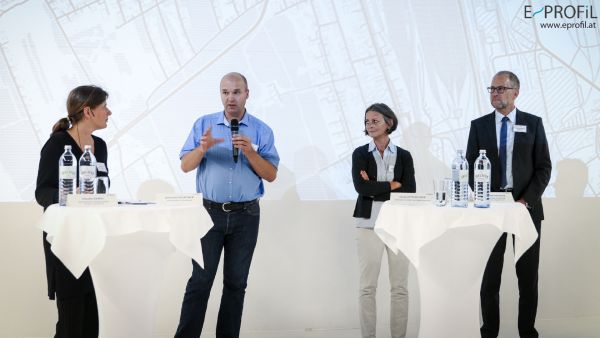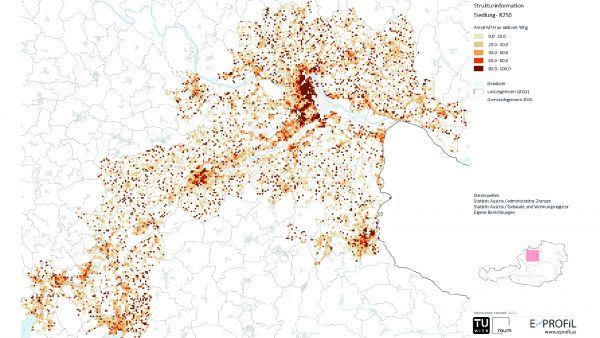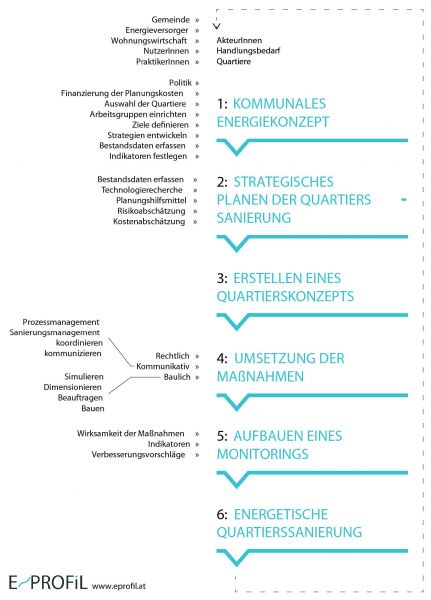E_PROFIL - neighborhood profiles for optimized energy transformation processes
Short Description
Summary
Urban neighborhoods as starting points for resilient energy supply
Reaching climate targets makes it necessary to improve available climate, energy and economic policy instruments in order to pursue new and more effective strategies: For the urban built environment, this means, on one hand, a significant decrease in energy demand through thermal rehabilitation, and on the other hand a move towards renewable energy sources. It is fundamental to establish resilient energy supply systems: To secure supply, and to utilize local potentials of small-scale renewable energy sources, taking into consideration local conditions and interests.
In contrast to other strategies aimed at singular buildings or energy systems, E_PROFIL focuses on two main topics, enabling an energetic management of urban quarters:
Small-scale conditions for energy transformation processes in urban settlement structures
GIS-based spatial analysis, e.g. in Central Upper Austria, provides multiple insights into an orientation framework that includes thermal saving potentials, solar energy potentials, as well as small-scale sociodemographic and building structure preconditions. The results of a representative survey of households carried out in all Austrian urban regions, show a multitude of experiences, expectations and interests in measures that increase energy efficiency, both on the building and neighborhood level. Based on these insights, an orientation frame for effectively steering energy transformation processes is developed.
Energy transformation processes at the neighborhood scale as a methodological contribution to resilient urban development
For this reason, the project aims at developing a methodology at the neighborhood level that does not focus on singular buildings, but puts thermal rehabilitation on a neighborhood level at the center. In cooperation with the City of Linz, two urban quarters with a wide variety regarding energy savings potentials, social preconditions and interests were chosen. A set of methods/toolkit for supporting energy technical transformation processes at the neighborhood level was elaborated and put into practice for the two chosen quarters in Linz. This toolkit can contribute towards generating affiliated solutions that take into account local potentials and open the perspective towards measures that are effective on a neighborhood level, instead of focusing on singular buildings.
A set of methods for the neighborhood scale
The set of methods elaborated in E_PROFIL enables the management and design of a path towards optimized and resilient energy supply and considers local interests. This approach, therefore, supplies an important asset for both research and planning activities in urban neighborhoods.
E_PROFIL has been designed as an interdisciplinary project in order to connect research and planning, and to be able to tackle practical challenges in urban neighborhoods: TU Wien's Centre of Urban and Regional Research, Centre of Public Finance and Infrastructure Policy (both at the Department of Spatial Planning), and Department of Building Physics and Building Ecology (Institute of Architectural Sciences) cooperate with WU Vienna's Research Institute for Urban Management and Governance, Ars Electronica Futurelab (Ars Electronica Linz GmbH & Co KG), the magistrate of the City of Linz, Linz AG and the panning office mecca consulting.
Project Images
Terms of use: The pictures listed underneath the header “Project Pictures” originate from the projects in the frame of the programmes City of Tomorrow, Building of Tomorrow and the IEA Research Cooperation. They may be used credited for non-commercial purposes under the Creative Commons License Attribution-NonCommercial (CC BY-NC).
Project Partners
Project management
Fachbereich Stadt- und Regionalforschung, Department für Raumplanung, Technische Universität Wien
Project- or cooperation partners
- Forschungsinstitut für Urban Management and Governance, Wirtschaftsuniversität Wien
- Abteilung Bauphysik und Bauökologie, Technische Universität Wien
- Ars Electronica Futurelab, Ars Electronica Linz GmbH
- Magistrat der Landeshauptstadt Linz, Direktion Stadtentwicklung
- Linz AG für Energie, Telekommunikation, Verkehr und kommunale Dienste
- mecca consulting - Ingenieurbüro für Raum- und Landschaftsplanung
Contact Address
Univ.Prof. Mag. Dr. Rudolf Giffinger
Fachbereich Stadt- und Regionalforschung, Department für Raumplanung, Technische Universität Wien
Operngasse 11
A-1040 Wien
Tel.: +43 (1) 58801 280233
E-mail: rudolf.giffinger@tuwien.ac.at
Web: www.srf.tuwien.ac.at

